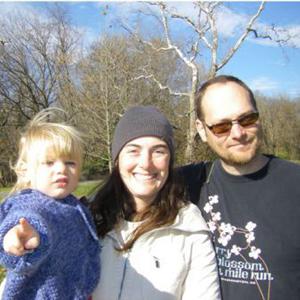Meet EPA Scientist Chris Weaver, Ph.D.

Investing in Climate Science
EPA scientist Dr. Chris Weaver’s research focuses on climate change science, especially evaluating the specific risks global change poses to air quality, water quality, human health, and ecosystems. His work has included modeling how cloud cover effects climate change, looking at the dynamics of climate change and the terrestrial water cycle, the impacts of land-use and land cover change on weather and climate, and the implications of uncertainty for assessing the potential impacts of global change.
Dr. Weaver is currently on assignment as the Deputy Executive Director of the U.S. Global Change Research Program (USGCRP) through the White House Office of Science and Technology Policy.
He spends most of his free time getting out and about with his wife, Sarah, and young son, Henry. Occasionally, he has time to pursue his hobby of playing, performing, and recording music.
How does your science matter?
Right now, I help lead the U.S. Global Change Research Program, a Federal program that coordinates and integrates global change research across 13 government agencies (including EPA) to ensure that it most effectively and efficiently serves our Nation and the world.
I think this matters because the problems we are facing related to climate change are quite complicated and interdisciplinary. For example, how will we protect coastal wastewater facilities, both now and decades into the future, from problems such as sea level rise, coastal erosion, and heightened storms? Or how can we continue to ensure clean air for our citizens in the face of potential impacts of climate change on ozone and PM air quality?
Those questions are complicated, and the knowledge needed to answer them may lie within complex agencies in the government. So there is a need to bring these agencies together, not just for efficiency, but to integrate that knowledge so we can answer these kinds of important questions. By working together across the government, we’re increasing our ability to do research that supports national needs for information about climate change.
As a scientist at EPA, I can help bring back that information to hopefully help us continue to meet our mission of protecting human health and the environment into the future.
When did you first know you wanted to be a scientist?
A lot of my interest in science came from my dad, who was a physicist and professor at Tufts University in Boston, Massachusetts. I always wanted to be like my dad.
If you could have dinner with any scientist, past or present, who would you choose and what would you ask them?
This is easy for me. I’d say my dad, who passed away a few years ago, as well as one of my two brothers who is also a scientist, a professor at UC-Davis. I’d like to talk to my dad, as I obviously haven’t gotten to talk to in many years, and my brother, because he lives on the other side of the country, and I don’t get to see him as much as I’d like.
What do you like most about your research?

I’ve always been interested in the process of discovering new things. I’m working at EPA because I like to see the immediate usefulness of science, as well as working deliberately to connect the science with a need that our country has. Knowing that we’ll be able to use what we learn from scientific research for a problem we’re trying to solve, that’s what is the most exciting for me.
Tell us about your background.
I got my Ph.D. in oceanography from the Scripps Institute of Oceanography, but I mainly studied climate science. While I was there, I studied clouds and their role in the climate system. Clouds do a lot to determine climate in the short and long-term. They reflect a lot of sunlight, trap a lot of heat emitted from the surface, and so they’re a big piece of the puzzle for climate studies and climate change. Before that, I went to Princeton University for my undergraduate degree in geosciences.
Any advice for students interested in a career in science?
It depends on what you want to do with your interest in science. If you don’t want science to be part of your career, continue to seek out opportunities to learn more about science because it is rewarding to know more about how the world works.
If you’re interested in it being a part of your career, there are a lot of opportunities to be engaged with science and scientists in your career without necessarily being a research scientist.
If you do want to be a research scientist, you have to love the process of doing research and figuring things out. If that’s what gets you up in the morning, there is nothing better!
